Kugs das blog
Life on the inside... the making of a maritime journalist
The end of the beginning
Friday 15th September
Today marks the end of my internship and what I hope is to be the end of phase one of a future career in journalism.
Thanks, thanks and thanks
So here is a list of thanks to everyone who made the internship possible:
Thank you to Harry Theochari, global head of transport and Norton Rose Fulbright, for sponsoring this internship. You not only enabled me to be given a great opportunity but also have been jolly and welcoming whenever I have seen you. Huge thanks for that fancy-as lunch.
Thank you to everyone who supported the internship – Norton Rose Fulbright, Inmarsat, UK Chamber, Elabor8, Maritime London, ICS Shipping, ABP and Maritime Skills.
Thank you to everyone who let me intern with them – Norton Rose Fulbright, Inmarsat, Elabor8, Human Rights at Sea and Braemar.
Thank you to Jane Lougher and Captain Jessica Tyson for giving me this opportunity following my interview back in April.
And now onto the Lloyd’s List team who have been wonderful and who I’ll actually kind of miss. Just generally thanks to you all for helping me with my articles and answering my many, many, many questions.
Thank you to:
• Helen Kelly for her confidence in me to be the inaugural Tom Leander intern and for her advice on journalism and life
• Richard Meade for being around to tell me the difference between teu and dwt
• Gary Howard for pointing me in the right direction with articles and looking at my unedited articles and not ripping out his hair
• James Baker for his containers knowledge
• Janet Porter for helping me out with containers and all that goes with keeping them on board
• Linton Nightingale for answering questions with less and less reluctance each day
• Max Tingyao Lin for going through tankers with me
• Nidaa Bakhsh for teaching me on all things dry bulk
• Anastassios Adamopoulos for doing his best to answer every question I’ve ever had
• David Osler for talking to me about philosophy which I know so much more about than maritime
• Richard Clayton for sharing his vast knowledge of maritime
• Fred Williams for helping me find pictures for articles
• Julian McGrath for all the help on the technology that goes with digital journalism
• Divya Unadkat for being so approachable and chatty
• The Asia team, Nigel Lowry and Lambros Papaeconomou for everything they write that helped me expand my knowledge
What I have learnt
I think there are very few journalism internships that give a young person who hasn’t yet graduated such a hands-on experience and it has definitely made me decide to progress to a career in journalism, whether that be in maritime or elsewhere.
The opportunity to actually write articles has been great, whether it be casualty reporting, turning press releases into stories or developing my own pieces.
I did not make a single tea or coffee for anyone or fetch anyone’s laundry. All in all, I was a pretty well-treated intern!
Beyond the news team, the industry buy-in has been amazing and to be able to intern at other companies in the sector for a day or two is very different. From public relations with Elabor8 to human rights with HRAS and marketing at Inmarsat, it has all helped me understand the maritime industry and Lloyd’s List reporting better.
The amount I have learnt not just about the maritime sector but about writing and the real world in just a short amount of time has been immense.
Calling up and interviewing people, although daunting in my first few weeks because I was afraid of sounding incompetent, ultimately has exposed me to the investigative side of journalism.
It is also a very sociable and meeting people from various parts of the industry was great in terms of learning how everything fits together and making contacts.
Lastly, I just wanted to say that the team have all been very lovely and helpful. I have asked lots and lots of questions, some which likely question my common sense and intelligence, but them patiently explaining things has really helped make the most of my internship.
Pet peeve pedant
Most of the maritime industry will know (unless you’ve been living under a rock) that Lloyd’s List One Hundred Ports 2017 is out online and will be out in print very soon.
Number 93 – Chennai, India:
Linton and to be fair everyone else pronounces it Chen-nigh. Even searches of how to pronounce and Wikipedia say Chen-nigh.
Considering I pronounced Cartagena as Carta-jeana, it probably sounds hypocritical coming from me but Chennai is pronounced Chen-nay.
As someone who is pedantic about this from living in Chennai for a year, can everyone who reads this please tell Linton to start pronouncing it Chen-nay.
It has been a great three months and thanks to everyone I have met for welcoming me. It has become a routine now and to break it for my ten hours a week at university will be strange but also yay sleep.
Kugs out *mic drop*
London International Shipping Week 2017
Week beginning 11th September
This week marks the third instalment of London International Shipping Week, which offers more than 160 events across all sectors including ports, environment, safety, risk and many more.
On Monday, I began the day at City Hall for a Women’s International Shipping & Trading Association UK event on the impact of autonomous ships, robotics and the internet of things. The event highlighted how with growing technological change more could be done to diversify the maritime industry, which employs an embarrassingly low number of women.
Time and time again, when I attend any sort of event, I am reminded of how much of the industry is made up of greying white men, but attending WISTA was a refreshing change. There is simply no reason for not having more females speaking on panels or more females simply attending events themselves.
In his keynote speech at WISTA, UK shipping minister John Hayes said that the industry must do more to encourage women to join, which I wholeheartedly agree with.
Following this, Lloyd’s List Europe editor-in-chief Helen Kelly and I waddled around London for our evening of three events (it was supposed to be four but our navigation skills are questionable so we never managed to find one of them). The Lloyd’s List Business Briefing, Maritime Skills Alliance Reception and then back at City Hall for the WISTA & ABP networking event. We saw more greying white men speak, took in the beautiful views of London, and enjoyed wine and canapes which is what is really at the heart of these events, right?
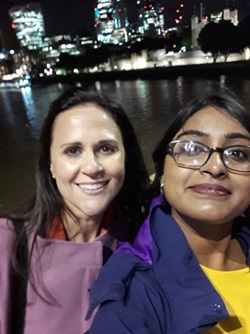
Tuesday began at the UK Chamber for the Merchant Navy Training Board’s briefing on inclusivity and diversity. This event highlighted how much the industry is doing to make the lives of seafarers better and the materials available to those in the industry.
Following this it was back at another Pret (thank you Jeffrey Hyman for finding the spot) to type up an article and to Inmarsat for digital disruption in shipping, which featured a panel that argued internal company dynamics complicate the industry’s appetite to embrace digital tools.
So far, LISW has brought together everything I’ve learnt in the past three months in a London setting. It has also shown me the sheer breadth of the global maritime industry. There are welcome changes coming, in regulation, autonomy and even diversity, and those changes are coming faster than I expected.
Wednesday marked a return to dry bulk with the Baltic Exchange Freight and Commodities Forum, and the steps the Baltic Exchange is taking to promote liquidity. This was followed by a return to Norton Rose Fulbright for an event on safety at sea – managing the risk and finally to the International Chamber of Shipping.
The bells of supply and demand
Tuesday 22nd and Wednesday 23rd August
Visiting Braemar helped me see the shipbroking side of the industry and drove home that supply and demand is the essence of shipping.
Sitting with various teams in Braemar, such as dry cargo, sale and purchase, offshore and liquefied petroleum gas, I got to see the process involved with connecting ships and cargoes, as well as ships and owners.
When I see press releases about a company buying, selling or demolishing a ship, I might think about the financial side to it but I don’t necessarily think about the process that goes behind it.
In terms of sale and purchase, it seems to work a little like selling a house. Potential buyers come and visit the ship and carry out inspections. If a buyer likes it, then an offer is made and the terms are drawn up. A sale form, such as the Norwegian Shipbroker’s Association’s Memorandum of Agreement, is used covering potential eventualities, such as if one party defaults or if the underwater inspections – similar to a survey in the property market – are found to be unsatisfactory.
When a person makes a good deal or their first fixture, the affixing bell is rung in the office, and I was told all shipbroking companies do this. When I think of bells, I think churches or temples, or the sadness of a bell ringing at school signalling that lunch was over; but this one had a nice, positive ring to it.
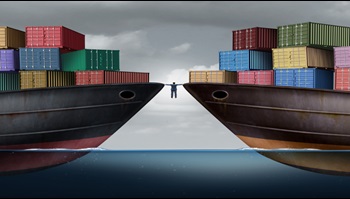
The research that Braemar compiles – particularly in the dry cargo department – was interesting, in that it helped me to understand how markets change, such as charter rates tumbling, a supply glut, and changes in fleet ages.
I was often told that in the early-2000s, leading to the financial crisis of 2008, the world was booming. Much like the Northern Line on a weekday morning, with the number of people cramming onto the tube growing at each station, that period saw incredible growth.
This growth eventually led to a bust, similar to the tube being delayed because someone’s bag got stuck in the doors. The tube goes on and you eventually make it to your station, and the economy has started to accelerate again, but will it ever reach the same pre-crash speeds?
Under the dry bulk wing
31st July – 4th August
I spent a week with Lloyd’s List shipping reporter Nidaa Bakhsh, learning about the inner workings of dry bulk. From shadowing her commentaries on panamax and capesize to learning about how the market has significantly improved since last year, there has not been a dry moment in my dry bulk tutelage.
Nidaa's daily visits to the Baltic Exchange website (with beady eyes) to look at the BDI and find out the reasons for any rises or falls put into perspective just how many different factors are involved, such as the emergence of demand to ship iron ore or lulls, depending on seasonal activity.
Looking into the demolition of vessels aged less than 15 years – deemed almost middle-aged in vessel age but not for humans – and the buying of bulkers for whopping amounts was interesting in terms of why companies take these decisions, and how market conditions had a part to play.
Bringing human rights to land and sea
Wednesday 26th July
This week, I visited maritime charity Human Rights at Sea and learnt more about its work as an organisation, but more generally the work of non-governmental organisations and charities to get human rights at sea in line with human rights on land.
The passing of the Universal Declaration of Human Rights in 1948, following the two world wars, more readily described what constituted taking away an individual’s rights, compared with previous conventions. Since then, many others, such as the Maritime Labour Convention or the UN Guiding Principles on Business and Human Rights, have been passed.
But because these are often not law, what counts as a violation of human rights becomes difficult to determine, especially at sea. Identifying cases becomes an issue of the people suffering the abuses having no real voice and perhaps being unaware that they do have rights.
Many also do not report abuses for fear of retaliation from their employers. Enforcement is difficult partly because there is a fragmentation of so many players involved, who could be spread all over the world, such as the shipowner, the manager, the P&I clubs and the register.
The other end of the spectrum
Monday 24th and Tuesday 25th July
Spending time at Elabor8, I discovered public relations is more than just communication and maintaining a client’s reputation.
Clients will have products, and PR turns that it into a story, bringing repute. It is the bridge between clients and the news or press releases that go out. Although atypical of the sector, some agencies are also responsible for placing adverts in magazines.
A lot of PR is about maintaining the prestige of a company. I was shown Meltwater, which is used as part of media monitoring. It presents analytics of how many times a person, company or anything else is mentioned in the media.
Obviously, after a few maritime searches, I used it to do a few random searches probably not so relevant to shipping, such as my own name – a more sophisticated Google search of oneself.
In anticipation of London International Shipping Week, I had the opportunity to attend an LISW conference and steering meeting, and see the preparation that goes towards ensuring this event highlights the UK as a maritime nation.
Law, law, food
Thursday 20th July
I visited Norton Rose Fulbright to spend the day with Lloyd's List Tom Leander internship sponsor Harry Theochari. I was given a brief introduction to what the transport division of the firm does and how that has changed since the 2008 financial crisis.
I left with a better understanding of maritime law, a folder of papers on shipping finance – including a large document on the types of vessels – and three volumes of books edited by Harry.
Ship registration is the documentation of vessels and an important part of international law. I learnt that not all ship registers handle the same type of vessels and to fly the flag of a nation, means the laws of that nation applies. The top register is currently Panama, complying with the regulation imposed by bodies such as the International Maritime Organization.
Following the fanciest lunch I’ve ever had in my life, prepared by the in-house chef, I visited the Royal Courts of Justice. I got to walk around the building and see the different rooms and sit in on a case at the Rolls Building.
The day ended back at the office to learn more about what Norton Rose Fulbright is doing to encourage diversity within the organisation.
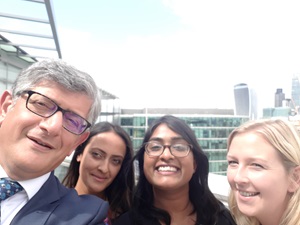
Selfie time: Left to right, Harry Theochari, Selina Purewal, Me, Amy Luck
Communications at sea
Wednesday 12th July
This week I visited Inmarsat, a satellite telecommunications company, where we talked about the importance of communication at sea and cyber security.
The day began with several meetings and it was interesting to see the marketing side to the industry and the creativeness that goes with it.
My favourite part was the simulation of the Global Maritime Distress and Safety System, or GMDSS. I got to steer a vessel (a simulated one, not a real one) that was going to call at Portsmouth but then had to respond to a distress call and rescue people on a lifeboat.
As I made my way to the lifeboat without hitting any of the cargo at sea, tragedy struck in the form of a storm. After throwing a rope to the lifeboat, I had to turn the vessel around.
It was only a simulation but I feel less nervous about making a turn in the road than having to steer the vessel slowly so as not to lose the lifeboat and the people in the stormy conditions.
All was going well, despite the storm, and the lifeboat was still attached and I could make out the port of Portsmouth in the distance, and then… engine failure and I had to send out a distress call.
I’m a little disheartened that the simulation didn’t let me make it to port but I think the point of the exercise was to show the importance of safety and the benefits of communications, and also what a great driver I am (not in real life, though).
Cyber security and the GDPR
I talked to the senior vice-president of safety and security services at Inmarsat, Peter Broadhurst, about cyber security and the Petya attack on Maersk.
The real problem with cyber-attacks like Petya is the breach itself. He said companies must understand the risks associated with cyber threats. A wider discussion needs to be had about the issues associated with technology, so the industry can take appropriate steps to mitigate the risks.
Under the GDPR, breach notification will become mandatory in all member states and must be done within 72 hours of first having become aware of the breach. This could mean Maersk will have to provide details of the attack and the steps it has taken.
Connectivity at sea
I talked with senior vice-president, market strategy, for Inmarsat Maritime, Drew Brandy, about access to internet at sea based on Nautilus International’s ‘An investigation into connectivity at sea’.
“Access to the internet is a basic human right in this day and age,” said Mr Brandy.
The Maritime Labour Convention recommends that seafarers should have reasonable access to telephone communications, email and internet facilities at a reasonable cost. This is often not the case. While most ship operators do provide some form of access, there are several restrictions in place, including high costs for usage.
Many companies state cost as a reason for not providing sufficient internet access, or providing it at a high price, especially considering the state of the market and the need to cut costs in order to make profits. According to the paper, the cost of improving connectivity to at least basic vessel connectivity accounts for only 0.3% of the total cost of operating a vessel.
Beyond costs, fears of crew being distracted and anti-social behaviour exists. But perhaps a more crucial and acceptable reason for any restrictions is concern about how the internet is being used. Training and policies around internet usage are required to alleviate this concern.
Mr Brandy says young people want to be connected and if the industry is to encourage young seafarers to join, the internet is a must.
He expects in the next five years, more than 50% of seafarers will be connected at sea. This is a significant change and one the industry should welcome.
Discovering the shipping industry
Friday 7th July
The UK Chamber’s Introduction to Shipping course provided an understanding of UK shipping and the regulatory environment.
The course covered international regulation, crewing and employment, ports and their customers, the Merchant Navy, running a shipping business in the UK and much more.
A key focus on regulation confirmed how heavily regulated the shipping industry is. There are many different bodies that prescribe regulations, especially concerning safety and the environment.
For me, this course not only provided much-needed knowledge on shipping but was also a way to network with people who come from different parts of the industry whether from insurance or government, and to understand their relevance and interests in shipping.
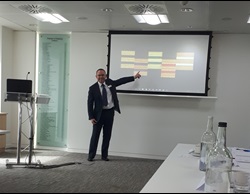
Tim Reardon, UK Chamber policy director, ferry and cruise.
Shipping in the media
In my first blog entry, I talked about how non-mainstream shipping is and that it’s only huge in mainstream media when something goes wrong.
The shipping industry operates macroeconomically. It connects trade and people and many sectors, and in that way, it is not necessarily niche. But yet it isn’t something the average person would think about. We don’t see ships the same way we see planes or cars.
Exports and imports play a huge role in the UK economy and contribute to jobs, and an increased choice in goods and services. This business is driven by the shipping industry. But is this a news story the same way an oil spill or large merger is or even innovation like autonomous ships? Probably not.
The trickle-down effect
Week beginning Monday 3rd July
This week is the 71st Marine Environment Protection Committee at International Maritime Organization HQ on London’s Southbank. With the ballast water treatment system implementation and reduction of emissions by ships at the top of the agenda, the shipping world awaits any big decisions.
Attending this and visiting the International Maritime Organization has been an enlightening experience on how consensus decisions are made.
The scope the IMO works on means there is a lot of procedural talk on top of the issues at hand. Compromise between the 171 member states is no easy task, perhaps even more so when economics, the ability of countries to meet targets and different methods to achieve tasks is considered.
What plays out in large halls with people sitting at desks with submission papers has such a crucial impact on the industry. The decisions made on shipping will also undoubtedly play a huge role for the average consumer.
With shipping accounting for some 95% of all goods that are traded, the economic effects environmental measures such as the ballast water treatment system or sulphur cap have on ships, will impact on trade. This will likely have a trickle-down effect on consumers and perhaps a shift in the delivery of goods.
And yet the average consumer would have no idea that MEPC, or the IMO, even exists.
I wonder what needs to happen to make that change?
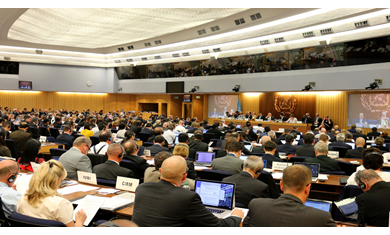
MEPC71 is under way this week.
The sea road to diversity
Friday 30th June
This week I have learned that just 2% of seafarers are women, with most of them employed in the cruise sector. I personally find this a shocking statistic and wanted to find out why this is and what it means for female seafarers and the future of global maritime.
I spoke to Dr Kate Pike of Southampton Solent University, who led the Gender, Empowerment and Multicultural Crews project, focusing on merchant navy crew ships. The project looks at gender issues on board, in context of a multicultural crew environment. The research and data findings seek to develop tools to empower and support women in the industry.
The study questioned seafarers from China, Nigeria and the UK.
In China, 17% said they had heard concerns about working on a multicultural crewed vessel. Participants were both male and female.
In Nigeria, discrimination was highlighted as a key issue facing female seafarers. It was thought that some ‘may be discriminated against by some gender biased crew members’.
In the UK, cadets were asked before their sea time, ‘What is the biggest issue you think females might face whilst on-board?’
Out of the 52 responses from UK cadets, 19% responded with sexual harassment, 12% mentioned sexism, and 8% mentioned loneliness, isolation and segregation.
Following their sea time, sexual harassment had become a reality and was mentioned by 16%, sexism by 9% and sexism discrimination at 6%.
The structural issues behind such a low representation of women in the industry is partly tradition but also the lack of awareness of the careers for women in the industry and women not being pushed at an early age towards science, technology, engineering, and mathematics (STEM) subjects.
Shipping is not typically promoted as an option to young people at school fairs, Dr Pike says. In most cases, it isn’t promoted until university level and by then it’s too late, as young people generally have a direction in mind by then.
Hopefully this is starting to slowly change. For example, the Careers at Sea Ambassadors campaign, has over 310 volunteers who visit schools and careers fairs to provide information about careers in the Merchant Navy. The IMO has a Maritime Ambassador Scheme in place who advocate for the maritime and seafaring professions in various ways such as visiting local schools.
It is hoped that by encouraging young people to join the industry through outreach programmes, apprenticeships and advertising that more women will be emboldened to join. It is possible that future generations that expect greater equality will not face as much bias, be that gender or otherwise.
In the meantime, Dr Pike says shipping companies must have a strategy to effectively deal with discrimination of any sort.
About 80% of crews are multinational, says Dr Pike. Discrimination within multicultural crews may occur due to cultural differences or communication problems. The crew mix may be one way to prevent this. Some companies only employ those nationalities they know get along with one another. Although, this to me seems to be a case of avoiding the issue at hand rather than changing opinions and preventing instances of discrimination in the first instance.
Mentoring is a cost-effective way to support both men and women who are perhaps vulnerable due to being minorities and may fear reporting any issues due to the hierarchical nature on board. Having a mentor means the individual knows that they have a listening ear.
Additionally, the Warsash Maritime Academy, where possible, tries to ensure two cadets go to sea together so they’re not on their own and have companionship.
Dr Pike reports that it is often the case that women who wish to have children leave seafaring and transition to shore, as they do not want to spend months at a time away. Or they do not have children. However, in the Philippines grandparents may look after children so women can go out to sea. Companies need to consider family life for all crew but particularly for women who may wish to have children.
Ship operators and managers should also consider the physical and medical needs of crew. The recent Women Seafarers’ Health and Welfare Survey of 595 female seafarers found that 47% reported joint/back pain and stress/depression/anxiety as the two biggest health challenges.
The biggest issue preventing female seafarers accessing healthcare while at sea was lack of confidentiality and over half responded that they would welcome routine wellness checks on board.
The survey was a joint initiative of the International Maritime Health Association, International Seafarers’ Welfare and Assistance Network. It also was conducted by the International Transport Workers’ Federation and Seafarers Hospital Society.
Training for senior officers is vital to deal efficiently with reports of discrimination or harassment. Many have not had women on board their ships before and it is shocking for them to deal with these issues when they arise. Appropriate training means that any reports will be dealt with quickly and efficiently.
Dr Pike says the industry is slowly changing, but that there is still a long way to go to reach United Nations recommendations of a 50-50 split in gender representation onboard.
“We know from research, that the industry is much more receptive than they ever have been to the cultural change when it comes to gender on board and that’s very promising and positive.”
If measures were taken to create an environment for women to take up seafaring careers and not be pushed onshore or out altogether, significant change can occur.
Could operating with an all-female crew be the answer? Can an all-female crew take the industry by storm and lead it to a promised land of equality?
The world of data protection
Wednesday 26th June
Attending Moore Stephens Maritime London Networking Event enlightened me to the world of data protection.
The event included a presentation by, Moore Stephens Associate Director, Christopher Beveridge discussing the EU General Data Protection Regulation, or GDPR.
As someone who at least briefly looks over terms and conditions and doesn’t completely ignore them and is on a lot of social media, I’m aware how important data protection is. There are so many companies out there holding my personal information, it’s almost shocking how little time I spent worrying about how that information is being used.
Although an administrative pain, the GDPR aims to give back citizens control of their personal data, power to the people like true democracy. But getting shipping in shape for this is a serious task.
From dealing with data portability requests to undertaking privacy impact assessments on any new systems, the shipping industry need to review and establish data privacy within GDPR by May 2018.

Diversity in the industry
Beyond the substance of the presentation itself and the negative impacts of failure to comply, I continue to be astounded by how few women I meet in the industry. Most of the women at this event, only a few in the first instance, crowded around a table eating together discussing why is there such a lack of representation of females in the industry among other topics of course.
As an industry that is not heavily advertised to young people, telling friends I was doing a maritime journalism internship was met with “What’s maritime journalism?”, “You’ll be writing about the sea… and ships?” and “Oh, like the International Maritime Organization?” These questions would have risen regardless of my gender but it remains that there is a gap and why is something I’ll be looking into.
Out with the old and in with the new
Lloyd’s List unveiled its new website on 11th June, made possible by the efforts of the team and especially so Julian and Gary.
Having joined only 4 days prior to the launch of the new website, I have little experience with the old one, but it’s enough to comment that the new website is sleek and easy to use.
Lloydslist.com is now clean, bold and easy to navigate. Even more helpful, especially when trying to find articles on much talked about topics like safety, is the filter by system. A good filtering system makes me leap for joy. It’s that huge difference between searching through 364 floral dresses and searching through 15 green floral dresses.
It joins with Insurance Day making both services accessible through one simple website. The website as a whole is brighter, bigger and better arranged, making for easier access to identify the Latest articles, Spotlight, Hot Topics, Containers and many more.
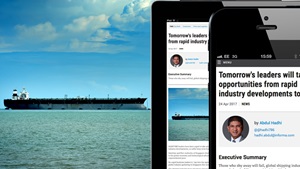
Ping pong stars
Friday 23rd June
Lloyd’s List creative designer Divya Unadkat organised a ping pong party at Bounce, Farringdon, to celebrate the unveiling of the website. Like a baptism but with ping pong and food and drink, which is how I would want to be welcomed into the world.
A year of table tennis club was not enough to reduce my rounders’ bat-worthy swing, and the ball hit basically everything and everyone except the table.
Imagine Wimbledon but with a table instead of a court, and with less of a crowd, but the fire to win; that was the enthusiasm of the more amateur players on the team.
Party time!
Monday 12th June
Thank you to all those that attended and for everyone who organised the event.
Based at the Norton Rose Fulbright office at 3 More London Riverside, the event was hosted and organised by those who made this internship possible.
Those in attendance knew of Tom or at the very least of his incredible work.
The evening consisted of speeches by Helen Kelly, Harry Theochari and myself (really just me saying thanks a lot); mingling (networking) and canapes and refreshments (hurrah).
Also, the view from the terrace was great, and I have some Instagram-worthy photos of the Thames and London Bridge now. And of course, the view represented the heart of the London maritime industry.
Basically, it was a lovely welcome to the shipping world, which many have said I will now never leave. I have been reeled in (haha) too young, but as I have discovered in these last few days shipping is a non-mainstream but exciting industry.
I have never been in a room full of people so passionate about shipping (though in the course of the next three months, I’m sure it’ll often be like this), and who made it seem so exciting. I look forward to seeing them all at some point again and talking more about shipping, whether the cargo, the ships themselves, the environment or the people side of things, or really just some good ol' conversation.
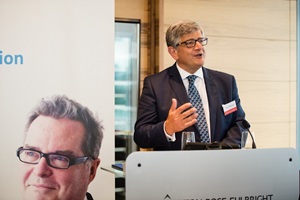
Norton Rose Fulbright global head of transport Harry Theochari remembered Tom.
The fairy godmother of shipping?
Admittedly, as someone who knew little about shipping, I was not sure what to expect from this internship. I was familiar(-ish) with what Lloyd’s List does from the late-night research I did before my interview and first day and in between, but I was still surprised at how important the information published in the articles are. It’s insane how little of this information is even considered by the general public. The whole intricacies of how the shipping is planned and tracked. So much effort and care goes into preventing potential disasters and the public only hears about the ones that do happen, rather than the tens of thousands which do not.
The first few days were marked by lots of reading (which as a Philosophy student I do enjoy, especially when it’s not very long texts, and instead lots of different topics) and acquainting myself better with the maritime industry. As well, as writing an article or two.
I’d like to thank everyone at Lloyd’s List for welcoming me on board and helping me out. I am grateful to you all and in particular, Anastassios (who I failed to individually thank in my speech on Monday, and who really wanted to be mentioned, deservedly of course), for guiding me through like a fairy godmother. Shout out to you dude for making time for my questions and ‘inquisitiveness’ and just checking to see how I was getting along, on top of your own work.
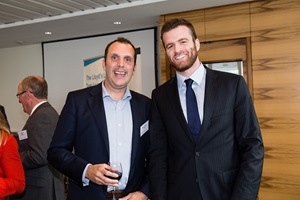
Inmarsat head of communications Mark Warner and Lloyd's List reporter Anastassios Adamopoulos.
